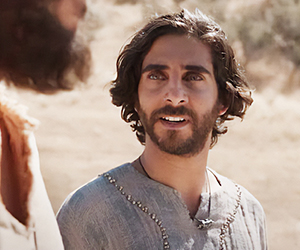When The Chosen: Last Supper was unveiled for Season 5, fans braced for a deeply emotional chapter including one of history’s most controversial figures—Judas Iscariot. The role carries immense weight, demanding an actor who can portray both charisma and internal conflict.
Enter Luke Dimyan, whose casting as Judas was as unexpected as it was fated.
Dimyan initially auditioned for various disciples but found himself uniquely suited for Judas. Amanda Jenkins, wife of show creator Dallas Jenkins, reportedly was the one who first said Dimyan was the one for the role. The secrecy surrounding the role made his selection all the more intriguing. While other cast members openly celebrated their parts, Dimyan had to sit on this revelation, knowing he had been entrusted with one of the most pivotal roles in the series.
Being cast as Judas Iscariot comes with its fair share of reactions. Dimyan has faced a mix of amusement, fascination and at times, strong opinions—especially from family. His grandmother, upon hearing the news, was not pleased, “She tried to throw her walker at me a few times,” he laughs.
The public reaction has been mostly positive, though some fans struggle with the idea of separating the actor from the role. Dimyan takes it all in stride, even joking that his biggest career achievement is that he “can afford healthcare now.”
Judas Iscariot is often viewed through a singular, condemning lens, but Dimyan approached the character with nuance and empathy. He saw Judas not merely as a villain but as a man whose choices, while devastating, were rooted in complex motivations.
Inspired by Ian McShane’s portrayal of Judas in Jesus of Nazareth, Dimyan studied the artistic fascination with Judas across history, from literature to film to music. Judas is a character that challenges audiences to wrestle with themes of betrayal, free will and redemption. Dimyan wanted to deliver a portrayal that reflected the slow, painful unraveling of a man who once had good intentions but succumbed to tragic misjudgment. Season 5 of The Chosen doesn’t rush Judas’ transformation from eager disciple to betrayer. Instead, the reliably spectacular writing crafts a deliberate devolution, making his eventual decision all the more heartbreaking.
One of the most emotionally charged scenes for Dimyan was the Last Supper, particularly the moment of tension at the table with Jonathan Roumie’s Jesus. The gravity of that interaction, where love, sorrow and inevitability collide, tested Dimyan’s depth as an actor. Dimyan recalls these moments as both terrifying and exhilarating—an actor’s dream challenge.
To enrich their performances, the cast of The Chosen participated in a traditional Passover meal led by Rabbi Jason Sobel. This firsthand experience allowed Dimyan to connect with the Exodus narrative, the same story Judas and the disciples would have meditated on that fateful night, “As we continued the feast, it gave me a huge appreciation for the tradition, and knowing the story of Exodus, the suffering at the hands of the Egyptian people that the Israelites went through.” Dimyan was particularly struck by the symbolic depth of the afikoman, the broken matzah that in Jewish tradition represents redemption—a theme woven throughout the Gospel.
Season 5 of The Chosen sets the stage for what will ultimately be a heart-wrenching progression toward Christ’s crucifixion. Dimyan describes this season as an essential but incomplete puzzle piece. “The story won’t be finished until Season 7,” he reminds fans, urging them to remain patient for the full impact of the narrative.
The Chosen: Last Supper carries a heavier tone, reflecting the growing tension between Jesus, His disciples and the religious authorities. Audiences should brace for darker themes, deep personal betrayals and a portrayal of Judas that will challenge preconceptions.
Luke Dimyan’s portrayal of Judas Iscariot is set to redefine how audiences perceive one of the most infamous figures in Bible history. Through careful storytelling, emotional depth and a fresh perspective, Dimyan brings Judas to life in a way that will linger with viewers long after the season ends. For audiences worldwide, the challenge is to engage with the story openly, to see the complexity of human choices and appreciate the craftsmanship behind this interpretation.
And as Dimyan wryly concludes, playing Judas wasn’t an easy decision. But, in the end, “They paid me. How could I say no?”













































I just saw The Chosen Parts 1 & 2. First – Bravo to all! The Writers, the Directors, the Cast,, crew, etc… are all brilliant! Im struggling to get a better understanding as to why Judas turned Jesus in. Ive come to understand that Judas never wanted Jesus to be killed, but to be set straight (on Judas’s terms. But Part 2 challenges me with that: his concern for Jewish [inherent] land, seems to be an issue, as we see in Season 4. He also steals money from the kitty; is appalled at the “waste of oil” Mary anoints Jesus’s feet with. So, I’m left a little confused on his final moment. Also, how is it that Caiaphas’s ornate robe is held by Pontius Pilate (before he wears it to the council with the Sanhedrin)? Thank you.